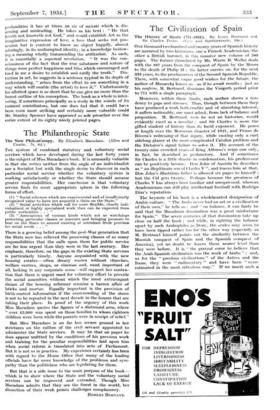The Philanthropic State
THE system of combined statutory and voluntary social services which have developed during the last forty years is the subject of Miss Macadam's book. It is unusually valuable in that she writes neither from the angle of an individualist nor a Socialist but with the single desire to discover in each particular social service whether the voluntary system is working satisfactorily or whether the State should assume greater responsibilities. Her conclusion is that voluntary
service finds its most appropriate sphere in the following forms of effort.
(1) "Social schemes which are experimental and-of insufficiently recognized value to have yet acquired a claim on the State." (2) "Social activities which call for more flexible, closely indi- vidualized or highly specialized work than can be expected from public authorities . . .
(3) "Associations of various kinds which act as watchdogs protecting particular classes or interests and bringing pressure to bear on the State to amend existing or introduce fresh provisos for social needs . .
There is a growing belief among the post-War generation that the State now has relieved the possessing classes of so many responsibilities that the calls upon them for public service are far less urgent than they were in the last century. Her emphasis, therefore, on the gaps in the existing State services is particularly timely. Anyone acquainted with the new housing estates —often dreary wastes without churches, welfare centres, shops, or cinemas and, most important of all, lacking in any corporate sense—will support her conten- tion that there is urgent need for voluntary effort to provide the social amenities without which the most extravagant dream of the housing reformer remains a barren affair of bricks and mortar. Equally important is the provision of birth-control information if the overcrowding of the slums is not to be repeated in the next decade in the houses that arc taking their place. In proof of the urgency of this work Miss Macadam quotes the figures of a distressed area, where "over £3,000 was spent on those families to whom eighteen children were born while the parents were in receipt of relief."
But Miss Macadam is on far less secure ground in her strictures on the calibre of the civil servant appointed to administer the State services. It may be that on paper he does appear unfitted by the conditions of his previous work and training for the peculiar responsibilities laid upon him when social reform is translated into acts of Parliament. But it is not so in practice. My experience certainly has been with regard to the Home Office that many of the leading officials have far more knowledge of the problems and sym- pathy than the politicians who are legislating for them.
But that is a side issue to the main purpose of the book— which is to show where the State and the voluntary social services can be improved and extended. Though Mies Macadam admits that they are the finest in the world, her dissection of their weak points challenges complacency.
ROBERT BERNAYS.






































 Previous page
Previous page